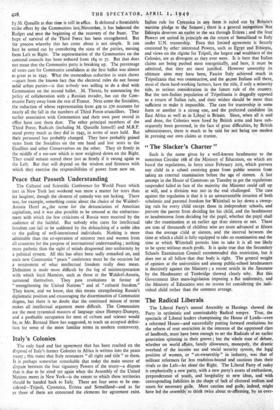Italy's Colonies
The only hard and fast agreement that has been reached on the disposal of Italy's former Colonies in Africa is written into the peace treaty ; this states that Italy renounces " all right and title " to them. It is perhaps somewhat remarkable that today the main source of dispute between the four signatory Powers of the treaty—a dispute that is due to be aired yet again when the Assembly of the United Nations meets in New York—is the extent to which these territories should be handed back to Italy. There are four areas to be con- sidered—Tripoli, Cyrenaica, Eritrea and Somaliland—and as far as three of them are concerned the elements for agreement exist.
Italian rule for Cyrenaica in any form is ruled out by Britain's wartime pledge to the Senussi ; there is a general recognition that Ethiopia deserves an outlet to the sea through Eritrea ; and the four Powers are united in principle on the return of Somaliland to Italy under U.N. trusteeship. Even this limited agreement is fiercely contested by other interested Powers, such as Egypt and Ethiopia, and views on the regime for Tripoli, the largest and wealthiest of the Colonies, are as divergent as they ever were. It is here that Italian claims are being pushed most energetically, and here, it must be admitted, that they are most justified. However unworthy its ultimate aims may have been, Fascist Italy achieved much in Tripolitania that was constructive, and the 40,000 Italians still there, most of them hard-working farmers, have the title, if only a minority title, to serious consideration in the future rule of the country. But the non-Italian population of Tripolitania is doggedly opposed to a return of Italian rule, and their wishes should be more than sufficient to make it impossible. The case for trusteeship in some form or another is a strong one, and the preferred candidate (in East Africa as well as in Libya) is Britain. Since, when all is said and done, the Colonies were freed by British arms and have sub- sequently been governed, in the face of great difficulties, by British administrators, there is much to be said for not being too modest in pressing our own claims as trustee.






































 Previous page
Previous page